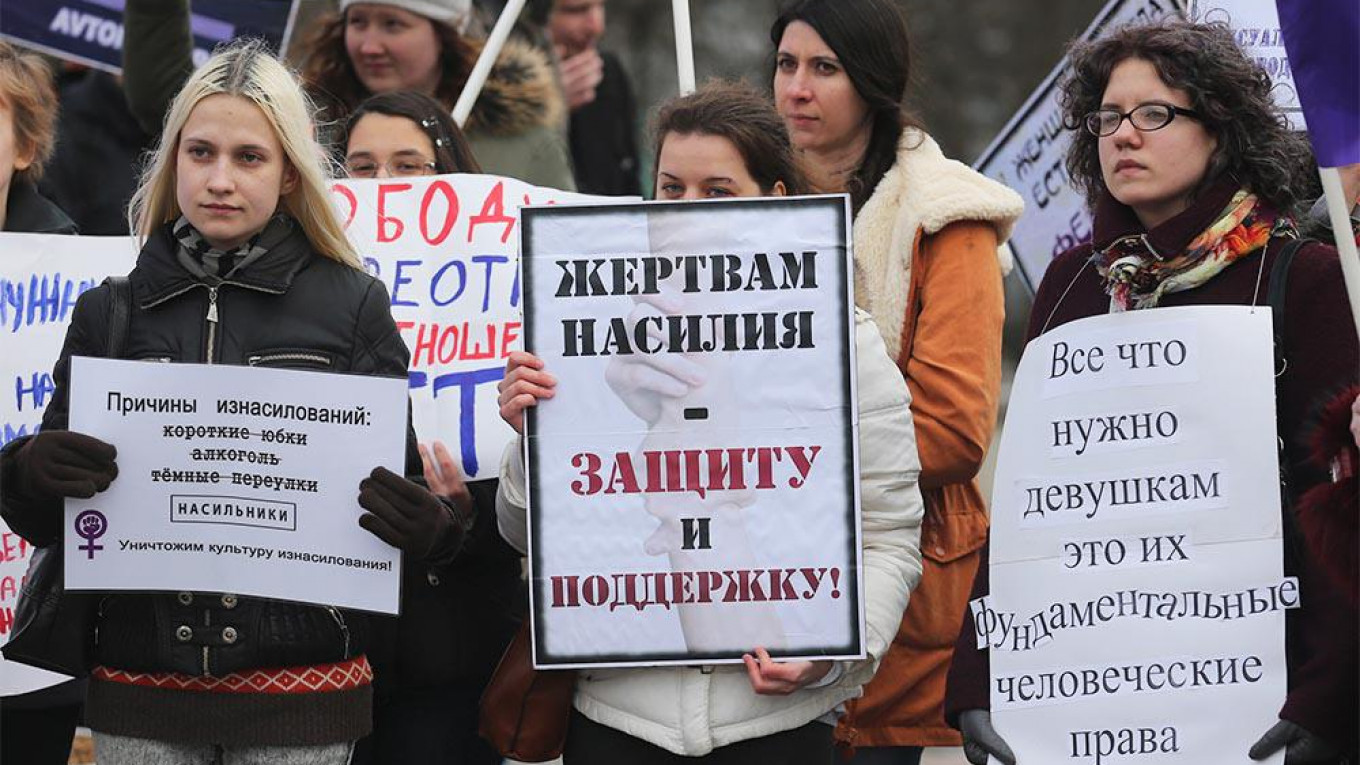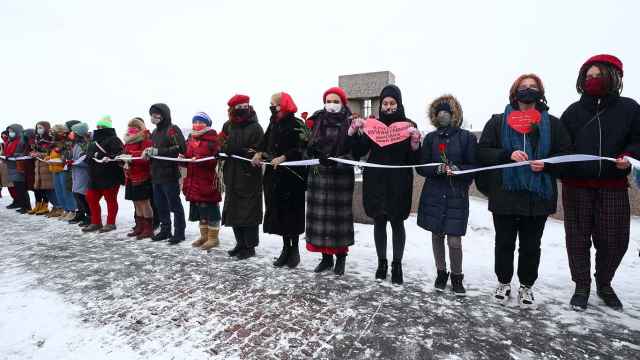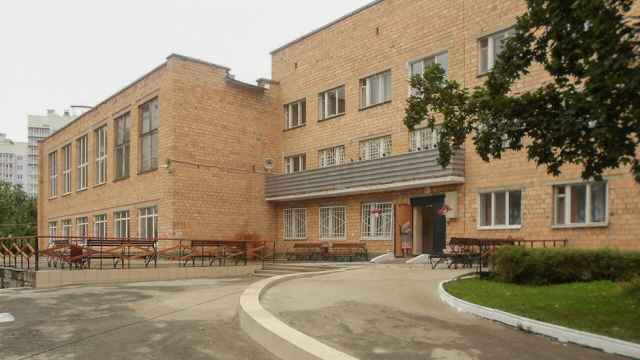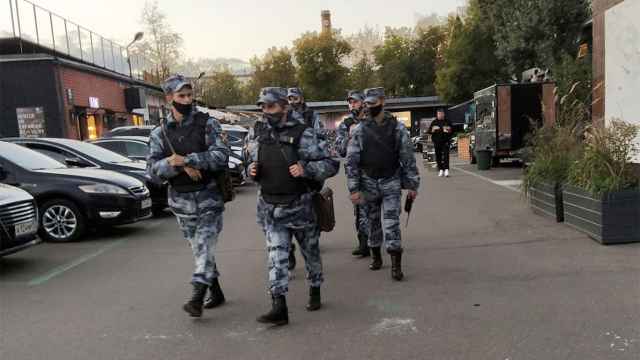For Svetlana, a 35-year-old mother of three from Moscow, domestic violence is a family affair.
Her ex-husband repeatedly threatened to take their son away and beat her mother. Last spring, it was Svetlana's turn.
“He cornered me in our flat in Moscow for several hours and beat me,” she remembers. “He tried to rape me and said he would pour acid over me.”
Even though months have passed since the attack, the agitation in her voice is palpable. Especially because, after she reported the incident to the police, her ex-husband got away with just a fine.
In Russia, domestic violence is often treated as a private matter and Svetlana’s case is far from unique, says Mari Davtyan, a women’s rights lawyer.
But nine months after Russia decriminalized domestic violence — to the great alarm of rights defenders — women like Svetlana have even less protection. “Victims like her are now totally ignored,” Davtyan told The Moscow Times.
Family dynamics
In February, Russian President Vladimir Putin approved a bill to downgrade "battery within families" — assaults which do not result in "substantial bodily harm" — from a criminal to an administrative offense.
Supporters of the new legislation argued that treating battery as a criminal offense encroached into family affairs and that parents could risk jail time for emotional spats or disciplining their children.
Under the new regulations, first-time offenders can be handed a fine of 30,000 rubles ($500), detained for up to 15 days or made to do community service. Criminal charges are only brought against offenders if beatings take place more than once a year.
Around 40,000 Russians are victims of domestic violence every year, according to official Interior Ministry statistics. But the real figures are likely much higher since many women — the majority of the victims — don't report abuse to the police, Davtyan says.
The softening of the rules means the difference between real and reported violence has grown, she adds. Victims don’t have access to police protection while their complaint is being processed and they have lost their right to appeal police negligence in handling their cases.
According to Anna Donich, the head of a crisis center for women in Irkutsk, just two percent of domestic violence victims see their attackers brought before a judge. Since February, she says, that number has dropped further and it is getting harder for victims to get the authorities on their side.
“Police are asking victims for more proof,” Donich says. “Only female police officers end up helping them.”
Tatyana Dmitriyeva, a social worker at the government-run family center in Tomsk in southern Russia, also says women are experiencing resistance from authorities.
“Recently one woman told us she had complained about her case to the police four times,” she says. “All her applications were rejected.”
Even police themselves have said that the recent legislation has made their work more complicated.
For the past six months, volunteers from the Russian Association of Women's Organizations have questioned 120 policemen throughout the country.
“Most of them, almost 90 percent, say the decriminalization of abuse hasn’t made their work easier,” says Davtyan, the lawyer. Another 89 percent said the best option would be to reclassify domestic violence as a criminal offense, she said, citing the same poll.
Sending a message
Marina Pisklakova-Parker, the head of the Anna Center NGO, which provides support to victims of domestic abuse, says the new law has also changed the general attitude towards violence in Russian society.
“For aggressors, the decriminalization was seen as a message that violence is acceptable,” she says. “Victims took it as a message that it would be harder to get help.”
Svetlana, from Moscow, experienced this psychological switch firsthand. “After the rules changed, my ex-husband began saying there is no way I could stop him, and he became more violent," she says.
Some women's centers, like the center in Tomsk, say they have been receiving fewer calls through their emergency helpline.
Women are growing increasingly disillusioned that anyone will come to their defense, says Dmitriyeva. “Women are slowly losing hope” she told The Moscow Times. "They’ve stopped even asking for help. Decriminalization may have reinforced that tendency.”
The Anna Center, on the other hand, has registered an increase in calls to its helpline. But, according to the center's Pisklakova-Parker, the figures tend to fluctuate, so it is hard to measure the direct result of the new bill.
In 2014, when Russia’s statistics agency Rosstat registered 15,000 cases of domestic violence, the center received around 2,000 calls. That number increased tenfold by 2016, when the agency recorded 27,000 cases of domestic abuse.
Yet despite the loud protest over the softening of punishment, the reality is that few women will have heard about the change in legislation or their initial rights to begin with, women's rights defenders say.
“The majority of victims who come to us know almost nothing about domestic violence legislation or decriminalization,” says Nadezhda Khudoyazh, the head of the Hope crisis center in Arkhangelsk in northern Russia. “Only experts know the law.”
Getting the word out
Seen that way, the decriminalization — and the public debate surrounding it — could have had the unexpected side-effect of making women more aware of the problem, Pisklakova-Parker tells The Moscow Times.
“Though it was a bad decision to decriminalize abuse, it got a lot of public attention. Russian society started to discuss this problem and how to treat it," she says.
“Women now know to get help, instead of working through their problems alone.”
Svetlana, who is still pushing for a harsher sentence for her ex-husband, agrees. "Standing up to him was not easy but I think that even if men are stronger physically, a woman with a mighty soul can fight their aggression," she says.
“I will write a book about how I fought my ex-husband and won,” she told The Moscow Times. “I hope it will help other Russian women to see their life from a different angle."
A Message from The Moscow Times:
Dear readers,
We are facing unprecedented challenges. Russia's Prosecutor General's Office has designated The Moscow Times as an "undesirable" organization, criminalizing our work and putting our staff at risk of prosecution. This follows our earlier unjust labeling as a "foreign agent."
These actions are direct attempts to silence independent journalism in Russia. The authorities claim our work "discredits the decisions of the Russian leadership." We see things differently: we strive to provide accurate, unbiased reporting on Russia.
We, the journalists of The Moscow Times, refuse to be silenced. But to continue our work, we need your help.
Your support, no matter how small, makes a world of difference. If you can, please support us monthly starting from just $2. It's quick to set up, and every contribution makes a significant impact.
By supporting The Moscow Times, you're defending open, independent journalism in the face of repression. Thank you for standing with us.
Remind me later.






